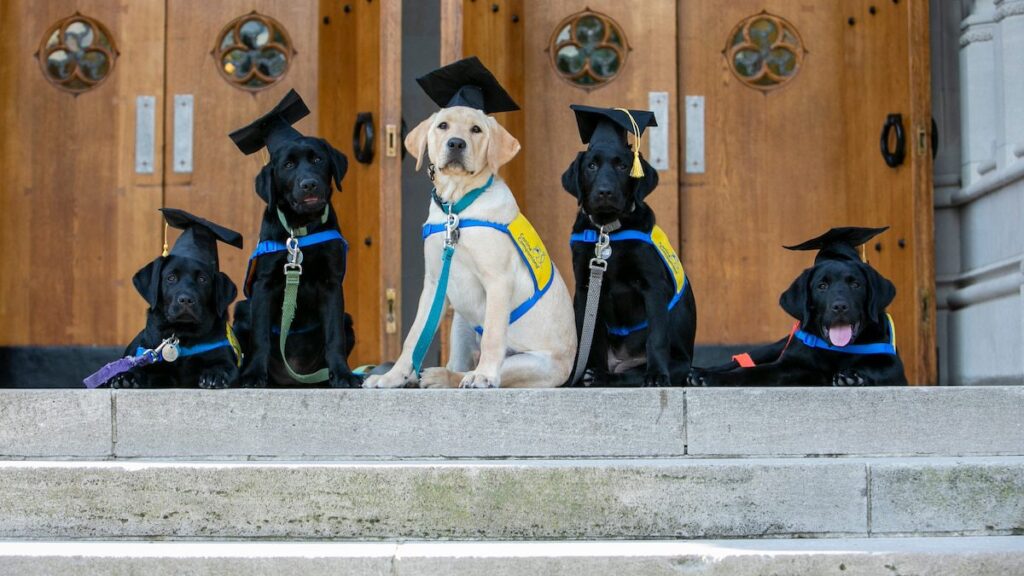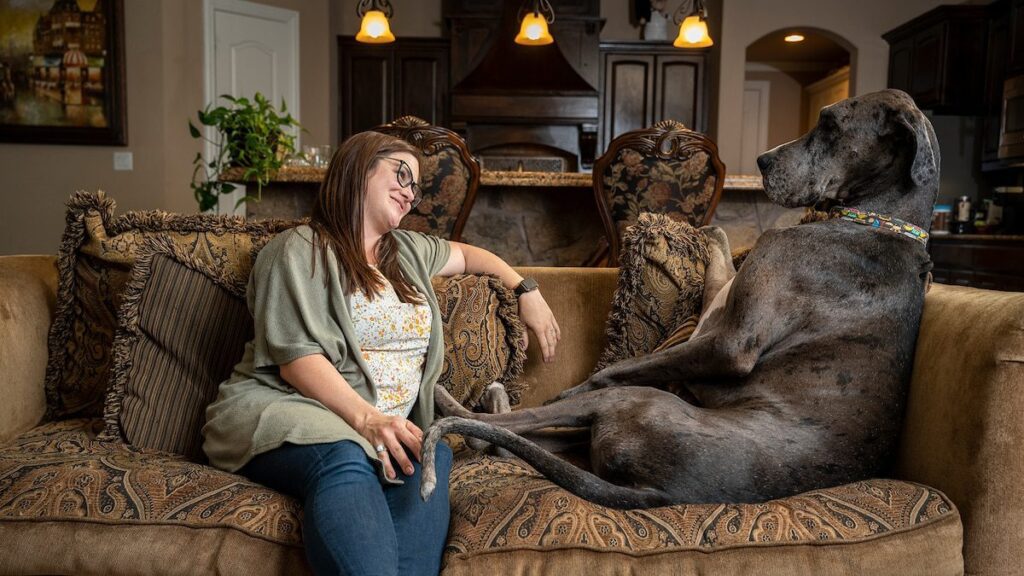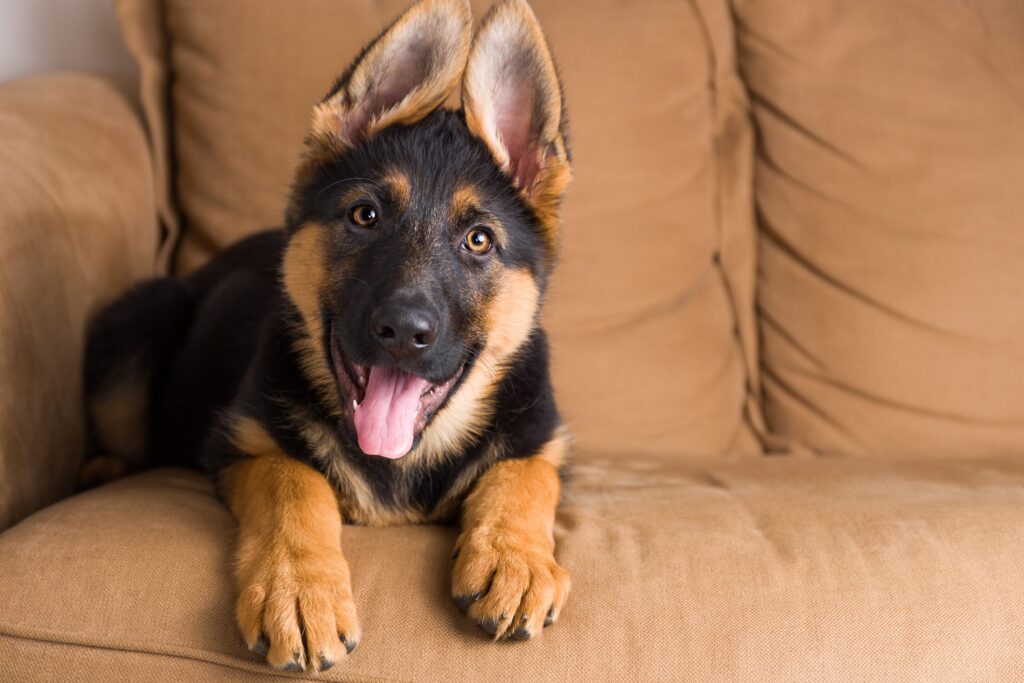At a special kindergarten in North Carolina, youngsters play, socialize, snooze, and learn how to sit, stay, and avoid pooping in the classroom.
These kindergarteners are dogs, not humans, enrolled in Duke University’s Puppy Kindergarten, but the specialized games and tasks these pups tackle in the classroom aren’t so different to those used to study the development of human children.
For both dogs and their human companions, learning new skills are key steps in their journey to adulthood. Duke researchers Brian Hare and Vanessa Woods modeled their curriculum on techniques that psychologists use to test children’s minds. Countless hours spent with the adorable but exhausting pups enabled them to pinpoint when key cognitive skills emerge at different times during canine development. These skills, like being able to retain memories and exhibit self-control, enable dogs’ amazing abilities to connect and cooperate with humans.
As dog lovers know, each pup is an individual. “Dogs have different types of intelligence, different cognitive profiles, and they are going to develop at different paces,” says Hare, an evolutionary anthropologist.
The research described in the engaging new book Puppy Kindergarten: The New Science Of Raising a Great Dog, grew out of Hare and Woods’s decade-long partnership with Canine Companions, the largest service dog provider in the United States. Nowadays, the dogs most people want as pets also look a lot like service dogs. “For 100 years, these service dogs have always had to fit into our families, be polite to people, sit in a cafe, walk nicely on a leash,” says Woods, director of the Duke Puppy Kindergarten. Drawing a road map of typical cognitive development in puppies can help predict which ones could excel as service animals and also help new dog parents raise great dogs.
When can puppies learn key skills?
In puppy kindergarten, the Duke team followed the development of 101 puppies, tested every two weeks between eight and 20 weeks old. All were Labrador retrievers or Labrador-Golden retriever mixes. Half lived at Duke, while the other half were raised in volunteer family homes. They supplemented that with studies of 221 puppies tested a single time, and 37 wolf puppies for comparison. (Research continues with a new class of pups currently enrolled at Duke.)


LIMITED TIME OFFER
The perfect gift for the history buff in your life. Give now and get a FREE TOTE BAG.
Data also poured in from almost 50,000 pet dogs of varied breeds who were tested at home by their owners through the Dognition project. Though big and small dogs do tend to develop a bit differently, breeds didn’t appear to matter for the cognitive abilities the group measured.
Puppy cognitive skills, it turns out, emerge and develop on this general timeline:
Good dogs must remember skills, past situations, and different people and places. Around eight weeks, puppies remembered where a treat was hidden, even after time passed or when they had been distracted during the hiding by a squeaky toy. Owners should take note; before memory develops, young dogs aren’t being bad or disobedient—they literally can’t remember what you want them to do.
Dogs need self-control to keep them on track when they want to play or chase squirrels instead of listening to humans. Puppies were first acclimated to getting a treat by going around to the open end of a cylinder. Researchers then swapped in a transparent cylinder. With a treat immediately in view but inaccessible, puppies had to remember the detour to the open end of the cylinder.
Understanding this timing could help owners face training dilemmas, like whether to respond to overnight barking. “We have data now that explains there is probably a transition,” Hare says. “Before 13 weeks, if they are barking, go get your dog. They aren’t trying to manipulate you, they aren’t going to learn a bad habit, they probably just need to go to the bathroom.” Once the pups have developed more self-control, by 13 or 14 weeks, owners can start to think about handling those midnight interruptions differently.
Around eight weeks puppies begin to read the way we communicate through hand gestures, facial expressions, and vocal signals and our cooperative intentions better than our great ape cousins. “And this at an age where they can barely walk across the room without falling asleep,” Woods adds. When humans pointed to a hidden treat, the puppies usually found it. The same was true when they used gestures the dog had never seen, like putting a marker near the hiding place. By 10 weeks, they’ve mastered the understanding of basic human gestures, their first cognitive skill.
Good dogs may be primed to learn these social, cooperative communication skills by their evolutionary history rather than life experiences. “When puppies are so young, having these abilities, it’s suggesting that this may be something that’s been built in by domestication,” says Angie Johnston director of Canine Cognition Center and Social Learning Laboratory at Boston College.
While puppies aren’t on the same cognitive level as human babies, the two species begin to develop some of the same skills at a very young age. Human cognitive development features a revolutionary period between nine and 12 months, when babies do things like follow gazes or gestures, and develop a window into the minds of others outside of themselves. “What makes dogs so humanlike is not just that they read gestures, it’s that is very early emerging in dogs the way that it’s early emerging in kids,” Hare explains.
(How did “puppy dog eyes” evolve?)
When faced with unsolvable problems, dogs use social problem solving—looking at people for help. Eye contact between dogs and humans is an extremely important part of our relationship; gazing even hijacks the human oxytocin loop that promotes bonding with our own infants.
Puppy kindergarteners given an unattainable treat in a snapback container, even for just five minutes every two weeks, doubled the amount of overall eye contact they made with humans. (Don’t worry: After 90 seconds, dogs get the treat no matter what.)
By this age puppies knew which towel had a bowl under it, versus which one was lying flat. They understood that when on a leash they could not move independently but were connected to a human. These understandings are key to training; a dog’s cognitive abilities here can also inform what they may or may not be trained to do.
Puppies began to solve more complex, multi-step problems by reversing course when solutions they’d learned started failing. In another cylinder experiment, researchers switched the closed end, so that puppies had to stop doing what previously worked to get a treat and do the opposite for success.
You May Also Like
This reverse learning skill underlies some of dogs’ most amazing abilities, like guiding the blind. For most tasks, a person asks and the dog uses a skill to respond and help. “But when a dog is leading a person who can’t see, the human may ask them to do something and they actually have to realize that, no, even though I know how to do that, I should not do that because they are wrong.” Hare says. “They’ve asked me to cross the street but a car is right there and that would be dangerous. So even though it’s the correct answer in one context, I have to actually not behave on that request, and I have to do something different. That is so hard for a dog to do.”
(When do puppies reach “peak cuteness”?)
Certified good boys and girls
Not every dog is cognitively equipped to be a service dog. But by figuring out what puppies might be thinking and when it’s appropriate to start training around specific mental abilities, humans can help every dog be their best.
Laurie Santos, director of the Comparative Cognition Laboratory and the Canine Cognition Center at Yale, says a lot of work has begun looking at what dogs know but very little research has explored when they come to know what they know. “We’ve long needed to know what’s developmentally appropriate for different stages of puppy development, but until Hare’s lovely work we just didn’t have answers.”
Because dogs are so emotionally close to us, we are sometimes too ready to see puppies as infants, Johnston says. “I think if owners are more aware, that perhaps their dog doesn’t have a capability yet, they can have different expectations.”
Hare and Woods stress that it takes time for puppies to go from the first emergence of these skills to mastery of them. Owners shouldn’t be discouraged if they see other pups progressing faster than their own. “It’s a hopeful message,” Hare says. “Don’t give up, They may be on a different trajectory, there may be all kinds of things that are developing at different rates, but they will get there in the end.”
Tired puppy parents can rest a bit easier because the pupils of puppy kindergarten are proof of Hare’s message. They might not all make the grade as service dogs, but by graduation every single one of them was sleeping through the night.



